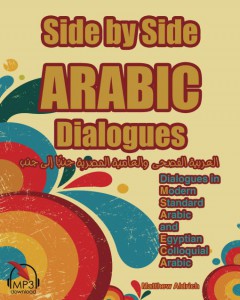Cairene Arabic; What? Why? How? Posted by Fisal on Jan 5, 2016 in Arabic Language, Culture, Pronunciation, Vocabulary
Ahlan, Arabic lovers! In the post entitled The Arabic Headache; Dialect!, we discussed the differences between Classical Arabic, Modern Standard Arabic and other Arabic dialects. We were introduced to a brief history of the Arabic language and how it developed into so many languages or dialects. We were also introduced to the main differences between Modern Standard Arabic (Fus’ha) and Colloquial Arabic (Am’iyah). Then in the post entitled Arabic! Which Arabic?, we tried to answer the question that most non-native Arabic speakers ask when they decide to learn Arabic; that is whether they should start with Fus’ha or Am’iyah. So, if anyone of you have made up their mind to learn the colloquial Egyptian Arabic, this post – and the posts to follow – might be helpful.
What is Cairene Arabic
- Cairene /kahy-reen, kahy-reen/ is another name for Egyptian Arabic.
- The word cairene is both a noun and an adjective; it refers to a native resident of Cairo and/or anything related to Cairo; the capital of Egypt.
- Based on the Random House Dictionary, the word cairene was originated during 1835 – 1845.
- Cairene is made up of the noun (Cairo) and the Greek suffix (ene).
- The Cairene Arabic is not only spoken by Cairene people but rather by all Egyptians.
- Egyptians speak in different Egyptian accents according to different local cultures.
- Local Egyptian cultures are mainly Urban, Rural, Nubian (Nubi) and Bedouin (Badawi).
- Urban or city Egyptian Arabic differs from city to city but Cairo is the largest and hence Cairene.
- You can find Iskandarani Egyptian Arabic that is of people from Alexandria; the second largest city as well as Damiatti Arabic, Qenawi Arabic, Aswani Arabic and so on.
- Rural Egyptian Arabic is that of the people living in villages.
- There are minor differences among all these Egyptian Arabic varieties. Don’t panic!
Why Learn Cairene (Egyptian) Arabic
If you have decided on Egyptian Arabic, then you must have your own reasons that may include one or more of the following:
- Academia: You might have decided to study in Egypt and whatever your area of study is, you will probably need to learn some Egyptian Arabic that will help you communicate in different situations whether in or off campus.
- Tourism: Egypt is a popular tourist destination with a diverse and huge wealth of antiquities. Tourists come from different corners of the world for different reasons. Despite the fact that you will find highly-qualified tourist guides who speak so many different foreign languages, but still, you will need to learn some Egyptian Arabic. You will not find a guide or an interpreter who works 24/7!
- Work: You might plan to work in Egypt, be it a diplomatic job or in a private sector business, you will still need Egyptian Arabic as it will make things much easier for you.
- Population: The population of Egypt reached 90 million this year. So, Egypt has the largest Arab population. Algeria has the second largest Arab population; 39 million!
- Popularity: Egyptian Arabic is dominant all over the Arab countries because of the Egyptian cinema, TV, radio and other forms of media that were started in Egypt a long time ago. There is hardly any Arab who doesn’t know a name or two of the Egyptian artists, actors or singers, males or females.
- Easiness: The popularity of the Egyptian dialect led many people to claim its easiness to learn and to understand. It is really easy compared to other dialects!
- Flexibility: Egyptian Arabic shares many rules with MSA. It is highly derivative. You can derive so many parts of speech. Besides, most Egyptian words are derived from Modern standard Arabic with a slight change in one letter or two. Also, Egyptian Arabic has so many loan words whether they are borrowed from Ancient Egyptian, Latin, Greek, English, French, Italian, Turkish or even Spanish.
- Resources: Being the most dominant spoken and understood Arabic dialect has made the Egyptian dialect one of the most studied dialects. This is clear because of the many resources that include songs, films, books, course books, research papers and websites. Here are some useful example resources for Egyptian Arabic:
- A Dictionary of Egyptian Arabic pdf
- An Arabist’s Guide to Egyptian Colloquial pdf
- “Grammatical Agreement Variation in Cairene Arabic” dissertation abstract
- “Egyptian Verse Drama: The Case of Naguib Surur” dissertation abstract
- “Optimality Theoretic Representation of Stress in Cairene Arabic” dissertation abstract
- Perspectives on Arabic Linguistics
- A Comprehensive Study of Egyptian Arabic
- Colloquial Arabic of Egypt
- Arabi Liblib: Egyptian Colloquial Arabic for Advanced Learner
- Kullu Tamam: An Introduction to Egyptian Colloquial Arabic
- Egyptian Colloquial Poetry in the Modern Arabic Canon
- Egyptian Arabic Dialect Course
How to learn Egyptian Arabic:
There are so many ways to help you learn the Egyptian dialect. I will answer this question in the next post. Stay tuned!
******

Check us back Soon
Peace سلام /Salam/

Build vocabulary, practice pronunciation, and more with Transparent Language Online. Available anytime, anywhere, on any device.
About the Author: Fisal
Well, I was born near the city of Rasheed or Rosetta, Egypt. Yes, the city where the Rosetta Stone was discovered. It is a small city on the north of Egypt where the Nile meets the Mediterranean. I am a Teacher of EFL.




